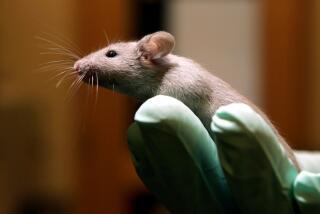French Admit Cyclosporine as AIDS Treatment Failed to Work
- Share via
French physicians acknowledged failure Tuesday in treating AIDS patients with the drug cyclosporine but said they will continue to test it on patients with antibodies to the AIDS virus who have not yet developed the deadly disease.
“In AIDS patients, it clearly does not work,” said Dr. Jean-Marie Andrieu of the Laennec Hospital in Paris.
In the other patients, “we don’t know,” he said.
The French researchers presented the first public scientific report on their controversial research with the drug, widely used to prevent rejection of transplanted organs, at the American Society of Clinical Oncology meeting in Los Angeles.
The physicians previously had been widely criticized for prematurely announcing at a Paris press conference last October “dramatic” improvement in two acquired immune deficiency syndrome patients after one week of cyclosporine treatment.
The sign of improvement--increases in the number of so-called T-4 immune cells--disappeared in all patients within three to five weeks, and the medicine was stopped, Andrieu said. Six of the seven AIDS patients who received the medicine are still living, he said.
False Hopes
“The press conference was catastrophic from many points of view,” said Dr. Philip Even, another member of the research team, citing the strong disapproval of physicians on both sides of the Atlantic who believed that false hopes were being raised.
Even blamed the French Ministry of Health for pressuring the doctors to contact the news media, thus bypassing the normal procedure of first announcing research results to the medical community.
The French research is based on the controversial theory that the AIDS virus, recently renamed HIV, or human immunodeficiency virus, triggers the victim’s immune system to attack and finally destroy itself. If the theory is correct, then cyclosporine, which supresses the immune system, might block the process.
Most AIDS researchers, however, say the AIDS virus directly attacks a variety of human cells, including nerve cells, the T-4 cells and other immune cells. If this is the case, cyclosporine might be useless or make the recipient more vulnerable to illnesses and subject them to side effects, such as kidney damage.
In Los Angeles, Andrieu said 8 of 16 patients with evidence of AIDS virus infection--but who have not developed AIDS--had “responded” to cyclosporine by showing increases in the number of T-4 cells to the normal range that have persisted for between one and five months.
The French physicians believe that increasing the number of T-4 cells may delay or prevent the development of AIDS. They cited another report at the meeting from the National Cancer Institute that people infected with the AIDS virus are much more likely to develop AIDS if they also have low numbers of T-4 cells.
It is currently thought that between 10% and 40% of the individuals contracting the AIDS virus will be ill with the disease within three years of becoming infected.
Andrieu said the patients who responded would continue to receive two doses a day of the liquid medicine for up to 10 months and that other patients will be started on treatment. The results are “very interesting” but must be interpreted “very carefully,” he said.
Andrieu was also encouraged by another finding in the eight patients who responded to cyclosporine. Enlarged lymph nodes “disappeared” in five of six patients who had such nodes, he said.
The interpretation was challenged by Dr. Alexandra M. Levine of County-USC Medical Center, who also presented a paper. Levine said lymph nodes in such patients often wax and wane in size spontaneously and sometimes decrease in size just before an individual develops AIDS.
Another leading AIDS researcher, Dr. Jerome E. Groopman of the New England Deaconess Medical Center in Boston, commended Andrieu for a “clear, honest and critical presentation” but expressed strong reservations about his plans to use cyclosporine, particularly on patients with the AIDS virus who are otherwise healthy.
“These patients may never develop AIDS,” Groopman said. “We have to look at the ethics of this very critically.”
More to Read
Sign up for Essential California
The most important California stories and recommendations in your inbox every morning.
You may occasionally receive promotional content from the Los Angeles Times.













